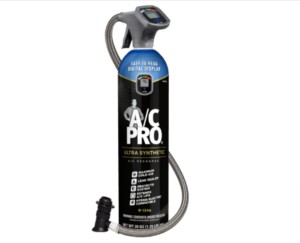A car’s air conditioning (AC) system is crucial for comfortable driving, especially during hot weather. When your AC isn’t blowing cold air, it might be time for a recharge. But how much does it cost to recharge your car AC? Let’s delve into the details.
Understanding the Importance of AC Recharge
The AC system circulates refrigerant, transferring heat from the cabin to the engine bay, where it dissipates into the atmosphere. A full system ensures the refrigerant cools the air effectively. Low refrigerant levels reduce cooling efficiency and force the compressor to work harder. This can lead to premature compressor failure or inconsistent cycling and diminishes the AC’s ability to cool the cabin.
 R134a Refrigerant for car AC recharge
R134a Refrigerant for car AC recharge
Signs Your Car AC Needs a Recharge
Several signs indicate that your car’s AC might need a recharge. These symptoms can vary based on climate and typical AC performance.
- AC Blowing Warm Air: The most obvious sign is warm air coming from the vents. This suggests low refrigerant levels, although it can also indicate other AC issues.
- AC Clutch Not Engaging: The compressor clutch might not engage or might engage sporadically if refrigerant is low, sometimes only when the engine is revved.
- AC Cools Only While Accelerating: If the AC only cools when driving, it could mean the compressor struggles to circulate refrigerant at low engine speeds due to low charge.
- Windows Won’t Clear: AC systems remove moisture during defrosting. If your windows are slow to clear, low refrigerant could be the cause.
- Recent AC Component Replacement: Opening the AC system releases refrigerant, requiring a recharge after component replacement.
DIY AC Recharge: Potential Drawbacks and Limitations
While DIY AC recharge kits are available, verifying the underlying problem can be challenging. If a leak exists, adding refrigerant may only provide a temporary fix. Without addressing the leak, the refrigerant will quickly escape again.
When to Seek Professional Help for Car AC Recharge
For leaks, vacuum testing is essential. This should be performed by a certified AC technician who can also recover any remaining refrigerant from the system. If your car loses its AC charge frequently (more than once every three years), a professional diagnosis, repair, and recharge are recommended to address the root cause.
Factors Affecting the Cost of Car AC Recharge
The cost of recharging your car’s AC can vary based on several factors:
- Refrigerant Type: Older vehicles might use R-134a refrigerant, while newer models use R-1234yf, which is more expensive.
- Labor Costs: Mechanic labor rates vary by location and shop.
- Leak Detection: If a leak is suspected, the cost includes leak detection services.
- Component Repairs: If the system has other issues, such as a faulty compressor or condenser, repair costs will be added.
Average Car AC Recharge Costs
Typically, a car AC recharge can range from $100 to $300. This estimate includes refrigerant and labor costs. However, prices can increase significantly if additional repairs are needed.
- DIY Recharge Kits: These kits can be purchased for around $30 to $70. Keep in mind the limitations mentioned earlier.
- Professional Recharge: This service generally costs between $150 and $300 depending on the factors above.
What Does a Professional AC Recharge Include?
A professional AC recharge service typically includes:
- System Inspection: Checking for leaks, damage, and overall system condition.
- Refrigerant Recovery: Removing any remaining refrigerant.
- Vacuuming the System: Removing air and moisture from the system.
- Leak Testing: Identifying and addressing any leaks.
- Refrigerant Recharge: Adding the correct amount of refrigerant.
- Performance Check: Ensuring the AC system is functioning correctly.
How to Save Money on Car AC Recharge
- Compare Quotes: Get estimates from multiple mechanics to find the best price.
- Address Issues Early: Catching and repairing minor problems can prevent more costly repairs later.
- Consider DIY Recharge (with caution): If you’re comfortable and confident, a DIY kit can save money, but understand the risks and limitations.
- Regular Maintenance: Keep your AC system maintained to prevent leaks and other issues.
Conclusion
Knowing the potential costs associated with an AC recharge can help you make informed decisions about car maintenance. Whether you opt for a DIY approach or seek professional help, understanding the factors affecting the cost ensures you receive the best service and keep your car’s AC running efficiently.
